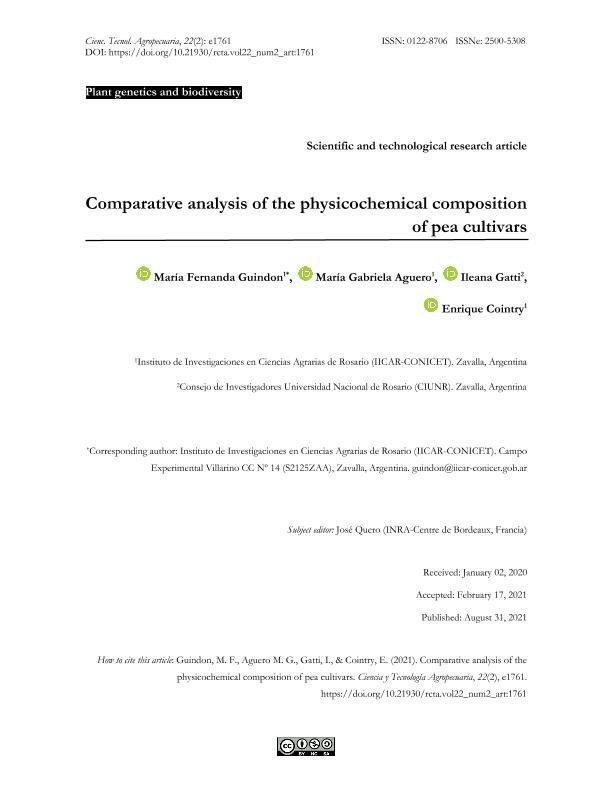Artículo
Peas are an inexpensive nutrient source. Basic information about variation in physicochemical composition is required to manage breeding programs and postharvest operations effectively. Different properties were measured in seeds from 16 promising pea genotypes to study variability between lines, degree of genetic parameters, and associations among different traits. Seed weight and diameter, pH, and titratable acidity showed the highest values for broad-sense heritability and the most negligible differences between the phenotypic and genetic coefficient of variation, indicating that these traits' variability was predominately due to genotypic differences. Genotypes had a wide-range profile that could be related to morphological and physiological properties. Yellow varieties showed superior values for weight and sizes (27.84 g; 0.57 cm) and small changes in diameter after hydration (48.35 %), while wrinkled varieties showed inferior moisture content (9.54 %), higher hydration capacity (1,314.66 g H2O/kg seeds), and protein content (28.88 %). Cuarentina and B315 were the more resistant and firmer materials; B315 also had the highest water hydration capacity, which would be appropriate for canning. Polyacrylamide gels demonstrated differences in protein composition; Gypsi contained more legumin (47.27 %) than the other genotypes, which is more beneficial nutritionally, and contained less convicilin (7.06 %), making it suitable for the food industry. Using accelerated aging, we studied color changes due to storage and established that the Viper line was highly tolerant to it. We could identify lines that may be exploited by industry or quality breeding programs. Las arvejas han sido reconocidas como una fuente económica de nutrientes; por lo tanto, se requiere información básica respecto de sus características físico-químicas para el efectivo desarrollo de operaciones de procesamiento y mejoramiento de las semillas. En el presente estudio, se midieron diferentes propiedades en 16 genotipos de arveja para estudiar la variabilidad entre líneas, los parámetros genéticos y las correlaciones entre caracteres. El diámetro y peso de la semilla, el pH y la acidez titulable mostraron valores altos de heredabilidad en sentido amplio y pequeñas diferencias entre los coeficientes de variación genético y fenotípico, lo que indica que la variabilidad para estos caracteres se debe a diferencias genéticas. Los granos amarillos mostraron valores superiores para peso y tamaño (27,84 g; 0,57 cm) y cambios menores en el diámetro luego de su hidratación (48,35 %), mientras que los granos rugosos mostraron menor contenido de humedad (9,54 %), mayor capacidad de hidratación (1.314,66 g H2O/kg semilla) y contenido proteico (28,88 %). Cuarentina y B315 fueron los materiales más firmes y resistentes; B315 además mostró alta capacidad de hidratación, lo que lo hace adecuado para la industria del enlatado. A través de geles de poliacrilamida se determinaron diferencias en la composición proteica; Gypsi contiene mayor cantidad de legumina (47,27 %), beneficioso desde un punto de vista nutricional, y contiene menos convicilina (7,06 %), beneficioso para la industria alimenticia. Mediante el envejecimiento acelerado, se estudiaron los cambios de color debido al almacenamiento y se estableció que la línea Viper experimentó menores cambios, por lo cual sería recomendable para largos períodos de almacenamiento. En este estudio se han podido identificar líneas que pueden explotarse en la industria o en programas de mejoramiento de la calidad de la arveja.
Comparative analysis of the physicochemical composition of pea cultivars
Título:
Análisis comparativo de la composición físico-química de cultivares de arveja
Fecha de publicación:
09/2021
Editorial:
Corporación Colombiana de Investigación Agropecuaria
Revista:
Ciencia y Tecnología Agropecuaria
ISSN:
0122-8706
e-ISSN:
2500-5308
Idioma:
Inglés
Tipo de recurso:
Artículo publicado
Clasificación temática:
Resumen
Archivos asociados
Licencia
Identificadores
Colecciones
Articulos(IICAR)
Articulos de INST. DE INVESTIGACIONES EN CIENCIAS AGRARIAS DE ROSARIO
Articulos de INST. DE INVESTIGACIONES EN CIENCIAS AGRARIAS DE ROSARIO
Citación
Guindon, María Fernanda; Aguero, María Gabriela; Gatti, Ileana; Cointry Peix, Enrique Luis; Comparative analysis of the physicochemical composition of pea cultivars; Corporación Colombiana de Investigación Agropecuaria; Ciencia y Tecnología Agropecuaria; 22; 3; 9-2021; 1-22
Compartir
Altmétricas




